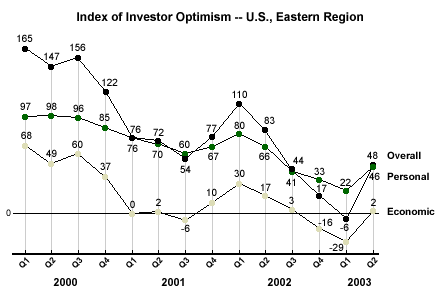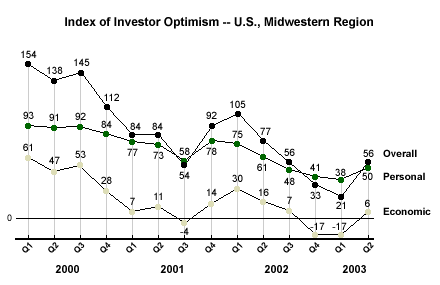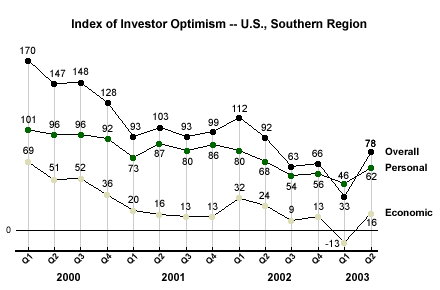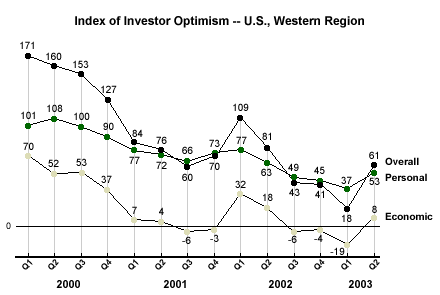Last week, the National Bureau of Economic Research (NBER) declared that the most recent recession lasted only eight months and ended in November 2001. As part of their much-belated declaration, a committee of academic NBER economists noted, "In determining that a trough occurred in November 2001, the committee did not conclude that economic conditions since that month have been favorable or that the economy has returned to operating at normal capacity."
If the recession was so brief and mild, why are so many people less optimistic now than they were in late 2001? According to quarterly data from the Gallup/UBS Index of Investor Optimism*, investor optimism surged 45 points during the second quarter of 2003, as the equity markets soared. Still, the data show that nationwide, the level of overall investor optimism for the second quarter of 2003 (62) is below where it was in the third quarter of 2001 (67), the fourth quarter of 2001 (86), and well below where it was in the first quarter of 2002 (109).
Eastern Region
During the first quarter of 2000, the Index stood at 165 in the Eastern region of the United States. By the third quarter of 2001, it had fallen by more than two-thirds to 54. During the fourth quarter of that year, as the 2001 recession bottomed out, investor optimism in the East increased 23 points to 77. In the first quarter of 2002, it rose another 33 points to 110. At that point, investor optimism in the East had made an amazing recovery since the Sept. 11 terrorist attacks, and was back to the national average, close to where it was during 2001's first quarter.
But it didn't last: optimism among Eastern investors then declined steadily, reaching -6 during the first quarter of 2003. In the second quarter of 2003, investor optimism surged 54 points to 48. This is a great improvement, although investor optimism in the East remains below the nationwide average, below its third quarter 2001 level, and less than half of its level from the first quarter of 2002.

Midwestern Region
In the Midwest, investor optimism finished the first quarter of 2000 at 154. Following the Sept. 11, 2001, attacks, the Index in the Midwest fell to 54 -- the same level as in the East. Between the first quarter of 2000 and the third quarter of 2001, optimism among Midwestern investors plunged 100 points, then improved sharply during the fourth quarter of 2001. Investor optimism in this region reached 105 in the first quarter of 2002.
By the first quarter of 2003, investor optimism in the Midwest had declined to 21. As was the case in all regions during the second quarter of 2003, optimism surged upward among investors in this region. At 56, the Midwest reading is close to the second quarter's nationwide average. However, investor optimism in the Midwest is essentially at its third-quarter 2001 level and at about half of its first-quarter 2002 level.

Southern Region
In the South, investor optimism fell from 170 in the first quarter of 2000 to 128 in the fourth quarter of that year. Following the Sept. 11 attacks, the Southern Index was at 93 -- substantially above the national average. During the next two quarters, optimism improved modestly among Southern investors and reached 112 in the first quarter of 2002.
Over the next year, investor optimism in the South declined substantially, dropping to 33 in the first quarter of 2003. During the second quarter, Southern investor optimism increased 45 points to 78, matching the increase in the East. However, as in the other regions, Southern investor optimism remains below its third-quarter 2001 level and at about a third of its first-quarter 2002 level.

Western Region
In the first quarter of 2000, investor optimism stood at 171 in the West; it dropped to 127 by the fourth quarter. By the third quarter of 2001, Western investor optimism had plunged to 60, but then improved slightly to 70 in the fourth quarter. In the first quarter of 2002, investor optimism in the West surged another 39 points to 109.
During 2002, optimism fell sharply among Western investors, reaching 18 by the first quarter of 2003. During the second quarter of 2003, Western investor optimism improved to 61, putting it essentially at the nationwide average. Still, investor optimism in the West remains at its third-quarter 2001 level and almost 50 points lower than its first-quarter 2002 level.

A Jobless Recovery?
Apparently, the NBER's academic economists believe we have been in a "jobless recovery," not a "jobless recession," since the end of 2001. Whatever their characterization, the regional trends in investor optimism paint a picture that looks more like a "double dip" in optimism than anything else.
Regardless, there is hope that the recent quarterly surge in investor optimism is a signal that a real economic recovery will begin. If not, the NBER may need to form a special committee to date periods of jobless recovery in the U.S. economy.
*Results are based on telephone interviews with more than 1,000 investors nationwide, aged 18 and older, conducted monthly since January 2000. For results based on these total samples, one can say with 95% confidence that the margin of sampling error is ±3%. Each region consisted of at least 600 interviews per quarter.
Gallup identifies these states as "East": Maine, New Hampshire, Vermont, Massachusetts, Rhode Island, Connecticut, New York, New Jersey, Pennsylvania, Maryland, Delaware, West Virginia, and the District of Columbia
Gallup identifies these states as "West": Montana, Arizona, Colorado, Idaho, Wyoming, Utah, Nevada, New Mexico, California, Oregon, and Washington
Gallup identifies these states as "South": Virginia, North Carolina, South Carolina, Georgia, Florida, Kentucky, Tennessee, Alabama, Mississippi, Arkansas, Louisiana, Oklahoma, and Texas
Gallup identifies these states as "Midwest": Ohio, Michigan, Indiana, Illinois, Wisconsin, Minnesota, Iowa, Missouri, North Dakota, South Dakota, Nebraska, and Kansas

